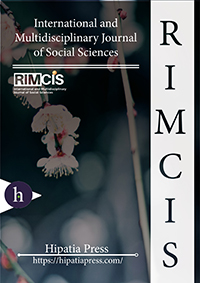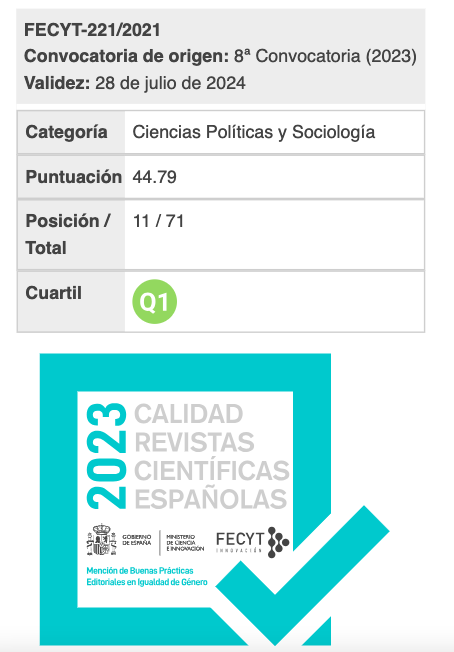Determination of women’s voting behavior; A machine learning approach in the Turkish political arena
Keywords:
Downloads
Abstract
Justice and Development Party (AKP) has been the ruling and biggest party in Turkey (AKP) since it has been established in 2002 and Republican People’s Party (CHP) has been the main opposition party (CHP) since then. These two parties receive about 75% of all the votes and half of the voters are females. To our knowledge, there is no such a study focusing on women’s party preferences in Turkey. Additionally, this is one of the very few studies in Turkey concerning voters’ party preferences. Therefore, this study aims to fill this gap in the literature. In this study, the important attributes of women in party selection decisions are analyzed. Center-periphery and social mobility theories are the two main theories explaining Turkish political life. The analyzed ideological, cultural, religious, social, economic and demographic characteristics of women supporters are selected according to these theories. Machine-learning techniques are employed as predictive tools. Results show that ideological attitudes like being leftist-rightist and religious values like headscarf, fasting in Ramadan, and praying are the most important effective attributes on party selection of women. However, socioeconomic, cultural, educational and demographic atributes are not effective on party selection of women in Turkey.
Downloads
References
References
Google Scholar CrossrefAK Parti. (2015). Parti Programı. https://www.akparti.org.tr/site/akparti/parti-programi#bolum
Google Scholar CrossrefAksoy, H. A. (2015). Invigorating Democracy in Turkey: The Agency of Organized Islamist Women. Politics & Gender, 11(01), 146-170.
Google Scholar CrossrefArat, Y. (2010). Religion, Politics and Gender Equality in Turkey: Implications of a Democratic Paradox?. Third World Quarterly, 31(6), 869-884.
Google Scholar CrossrefBreiman, L., Friedman, J. H., Olshen, R. A., & Stone, C. J. (1984). Classification and Regression Trees. New York: Chapman & Hall/CRC.
Google Scholar CrossrefCindoglu, D., & Zencirci, G. (2008). The Headscarf in Turkey in the Public and State Spheres. Middle Eastern Studies, 44(5), 791-806.
Google Scholar CrossrefCizre Sakallioglu Ü. (1996). Parameters and Strategies of Islam-State Interaction in Republican Turkey, International Journal of Middle East Studies, Vol. 28, No. 2, pp. 231-251 Published by: Cambridge University PressStable URL: http://www.jstor.org/stable/176426
Google Scholar CrossrefÇağatay, N., & Soysal, N. Y. (1990). Uluslaşma Süreci ve Feminizm Üzerine Karşılaştırmalı Düşünceler. Kadın Bakış Açısından 1980’ler Türkiye’sinde Kadın.
Google Scholar CrossrefÇaha, Ö. (2010). Sivil Kadın. Türkiye’de Sivil Toplum ve Kadın, Savaş Yayınları, Ankara.
Google Scholar CrossrefÇarkoğlu, A., & Toprak, B. (2000). Türkiye'de Din, Toplum ve Siyaset. Türkiye Ekonomik ve Sosyal Etüdler Vakfı.
Google Scholar CrossrefÇınar, M. (2008). The Justice and Development Party and the Kemalist Establishment. in Ümit Cizre (ed.), Secular and Islamic Politics in Turkey: The Making of the Justice and Development Party, 109-131.London, Routledge.
Google Scholar CrossrefDahl, Robert A. (1963). Modern Political Analysis, Englewood Cliff: Prentice-Hall Inc.
Google Scholar CrossrefDalmış, I., & Aydın,E. (2008). “The Social Bases of the Justice and Development Party,” in Ümit Cizre (ed.), Secular and Islamic Politics in Turkey: The Making of the Justice and Development Party, 201-222.London, Routledge.
Google Scholar CrossrefEsmer, Y. (1995). Parties and the Electorate: A Comparative Analysis of Voter Profiles of Turkish Political Parties. in Çiğdem Balim et. al. (eds.) Turkey: Political, Social and Economic Challenges in the 1990s. (pp74-89).Leiden, New York, Köln: E.
Google Scholar CrossrefFrey, F. W. (1975). Patterns of elite politics in Turkey. Political elites in the Middle East, 41-82.
Google Scholar CrossrefGoutte, C., & Gaussier, E. (2005, March). A probabilistic interpretation of precision, recall and F-score, with implication for evaluation. In European Conference on Information Retrieval (pp. 345-359). Springer, Berlin, Heidelberg.
Google Scholar CrossrefGeçer, E. (2013). Medya ve Popüler Kültür: Diziler, Televizyon ve Toplum, İstanbul: Okur Kitaplığı
Google Scholar CrossrefGöle, N. (1997). Secularism and Islamism in Turkey: The Mmaking of Elites and Ccounter-Elites. The Middle East Journal, 46-58.
Google Scholar CrossrefGönenç, L. (2006). 2000’li Yıllarda Merkez-Çevere Ilişkilerini Yeniden Düşünmek. Toplum ve Bilim, 105, 129-52.
Google Scholar CrossrefGuveli, A. (2011). Social and economic impact of the headscarf ban on women in Turkey. European Societies, 13(2), 171-189.
Google Scholar CrossrefHammer, P. L. (1986). Partially defined Boolean functions and cause-effect relationships, International Conference on Multi-Attribute Decision Making Via OR-Based Expert Systems, University of Passau, Passau, Germany.
Google Scholar CrossrefHammond, P. (1999). Can Religion be Religious in Public?, The Power of Religous Publicus: in William H. Swatos and James K. Wellman (eds.) The Power of Religious Publics: Staking Claims in American Society.(pp.19-31).Westport, PraegerPublishers.
Google Scholar CrossrefHürriyet. (2012). Diyanet İşleri Başkanı Görmez'den 'Kürtaj' Açıklaması, http://www.hurriyet.com.tr/gundem/20687889.asp
Google Scholar Crossrefİlyasoğlu, A. (1994). Örtülü kimlik: İslamcı kadın kimliğinin oluşum öğeleri (Vol. 5). Metis Yayınları.
Google Scholar CrossrefJanssen, K. J., Donders, A. R. T., Harrell Jr, F. E., Vergouwe, Y., Chen, Q., Grobbee, D. E., &
Google Scholar CrossrefMoons, K. G. (2010). Missing covariate data in medical research: to impute is better than to ignore. Journal of clinical epidemiology, 63(7), 721-727.
Google Scholar CrossrefKalaycioğlu, E. (1994). Elections and Party Preferences in Turkey Changes and Continuities in the 1990s. Comparative Political Studies, 27(3), 402-424.
Google Scholar CrossrefKass, G. (1980). An exploratory technique for investigating large quantities of categorical data. Applied Statistics, 29:2, 119–127.
Google Scholar CrossrefKhan, M. N. A., Qureshi, S. A., & Riaz, N. (2013). Gender classification with decision trees. Int. J. Signal Process. Image Process. Patt. Recog, 6, 165-176.
Google Scholar CrossrefKeyman, E. F., & Öniş, Z. (2003). Turkey at the Polls: A New Path Emerges. Journal of Democracy, 14(2), 95-107.
Google Scholar CrossrefLoh, W. Y., & Shih. Y. S. (1997). Split selection methods for classification trees. Statistica Sinica, 7, 815–840
Google Scholar CrossrefMardin, Ş. (1973). Center-periphery relations: A key to Turkish politics?. Daedalus, 169-190.
Google Scholar CrossrefMert, N. (2007). Merkez sağın kısa tarihi (Vol. 87). Selis kitaplar.
Google Scholar CrossrefNarli, N. (1999). The rise of the Islamist movement in Turkey. Middle East, 3(3), 39.
Google Scholar CrossrefOzbudun, E. (1976). Social change and political participation in Turkey, Princeton, NJ: Princeton University Press.
Google Scholar CrossrefOzbudun, E., & Tachau, F. (1975). Social Change and Electoral Behavior in Turkey: Toward A ‘Critical Realignment’?. International Journal of Middle East Studies, 6(04), 460-480.
Google Scholar CrossrefResmi Gazete. (2013). 6487 Sayılı Kanun. Bazı Kanunlar İle 375 Sayılı Kanun Hükmünde Kararnamede Değişiklik Yapılması Hakkında Kanun http://www.resmigazete.gov.tr/eskiler/2013/06/20130611-1.htm
Google Scholar CrossrefRosario, B., & Hearst, M. A. (2004). Classifying semantic relations in bioscience texts. In
Google Scholar CrossrefProceedings of the 42nd annual meeting on association for computational linguistics (p. 430).
Google Scholar CrossrefAssociation for Computational Linguistics.
Google Scholar CrossrefRuspini, E. and Dale, A. (eds) (2002) The Gender Dimension of Social Change: the Contribution of Dynamic Research to the Study of Women's Life Courses, Bristol: The Policy Press
Google Scholar CrossrefSabah Gazetesi. (2014). Bakanlık Kürtaj Rakamlarını Açıkladı. http://www.sabah.com.tr/fotohaber/gundem/bakanlik-kurtaj-rakamlarini-acikladi
Google Scholar CrossrefShils, E. (1975). Center and Periphery: Essays in Macrosociology. Chiago:The University of Chicago Press
Google Scholar CrossrefTachau, F. (1991). The Republican People’s Party, 1945-1980. Political Parties and Democracy in Turkey, 99-107.
Google Scholar CrossrefTamer, M. (2015). AKP % 25 kadın vekil diyor, CHP? http://www.milliyet.com.tr/akp-25-kadin-vekil-diyor-chp
Google Scholar CrossrefToprak, B. (1995). Islam and the Secular State in Turkey, İn: C¸ Igdem Balım, Ersın Kalaycıoglu, Cevat Karatas, Gareth Wıthrow & F. Yasamee (Eds) Turkey: Political, Social And Economic Challenges İn The 1990s, Pp. 90–96 (Leiden, E. J. Brill)
Google Scholar CrossrefToprak, B. (2009). Türkiye'de Farklı Olmak: Din ve Muhafazakarlık Ekseninde Ötekileştirilenler.
Google Scholar CrossrefTuncel, G., & Gündoğmuş, B. (2012). Türkiye Siyasetinde Merkez-Çevrenin Dönüşümü Ve Geleneksel Merkezin Konumlanma Sorunu. İktisadi Ve İdari Bilimler Fakültesi Dergisi, 14(3), 1-22.
Google Scholar CrossrefQuinlan, J. R. (1993). C4. 5: programs for machine learning. San Mateo, CA: Morgan Kaufmann
Google Scholar CrossrefWilson, R. L., & Sharda, R. (1994). Bankruptcy prediction using neural networks. Decision support systems, 11(5), 545-557.
Google Scholar CrossrefWitten, I. H., & Frank, E. (2005). Data Mining: Practical machine learning tools and techniques. Morgan Kaufmann.
Google Scholar CrossrefDownloads
Published
Almetric
Dimensions
How to Cite
Issue
Section
License
All articles are published under Creative Commons copyright (CC BY). Authors hold the copyright and retain publishing rights without restrictions, but authors allow anyone to download, reuse, reprint, modify, distribute, and/or copy articles as the original source is cited.















